Conflicting Views: Judicial Review and Accountability in Australia
VerifiedAdded on 2023/01/16
|11
|2960
|88
Essay
AI Summary
This essay critically examines the function of judicial review in maintaining accountability within the Australian legal system, addressing conflicting perspectives on its role in contemporary Australia. The essay begins by defining judicial review and its significance, then explores the absence of an explicit provision for judicial review in the Australian Constitution, while highlighting its established legitimacy through various constitutional provisions and case law. The essay discusses the complex relationship between judicial review and democracy, presenting arguments from jurists and authors on both sides of the issue. It delves into the grounds for judicial review, including illegality, irrationality, and procedural impropriety, and examines the limits imposed on judicial review, such as the requirement of finality or certainty. Furthermore, the essay analyzes the impact of judicial review on migration law, specifically focusing on cases related to visa cancellations and the interpretation of the Migration Act 1958, including Plaintiff M61/2010E v Commonwealth of Australia and Minister for Immigration and Citizenship v SZMDS, and CPCF v Minister for Immigration and Border Protection. The essay also considers the influence of judicial review on government actions and the ongoing debate over the balance between judicial intervention and the powers of the executive branch, concluding with an assessment of the competing views on judicial review and its implications for accountability and democracy.
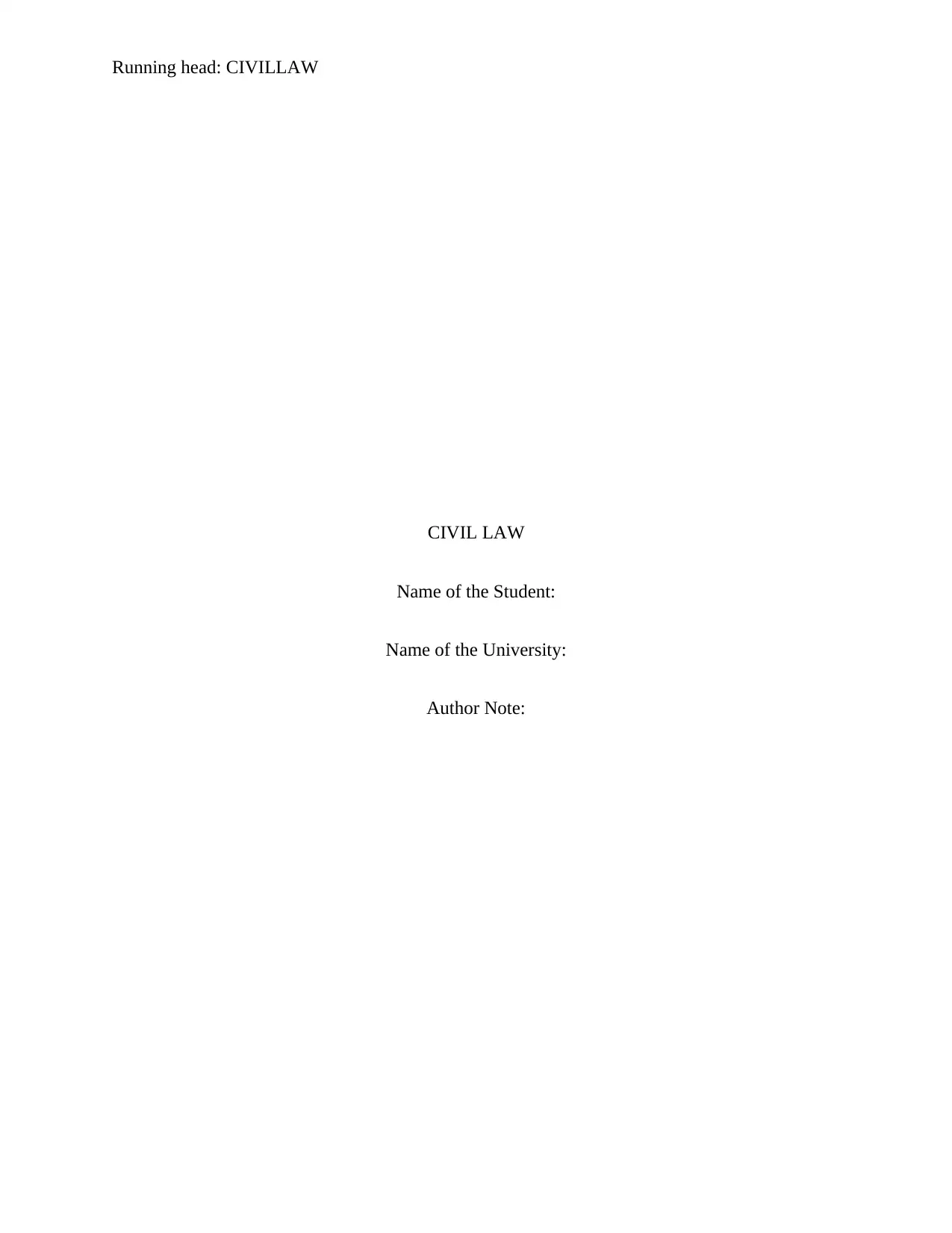
Running head: CIVILLAW
CIVIL LAW
Name of the Student:
Name of the University:
Author Note:
CIVIL LAW
Name of the Student:
Name of the University:
Author Note:
Paraphrase This Document
Need a fresh take? Get an instant paraphrase of this document with our AI Paraphraser
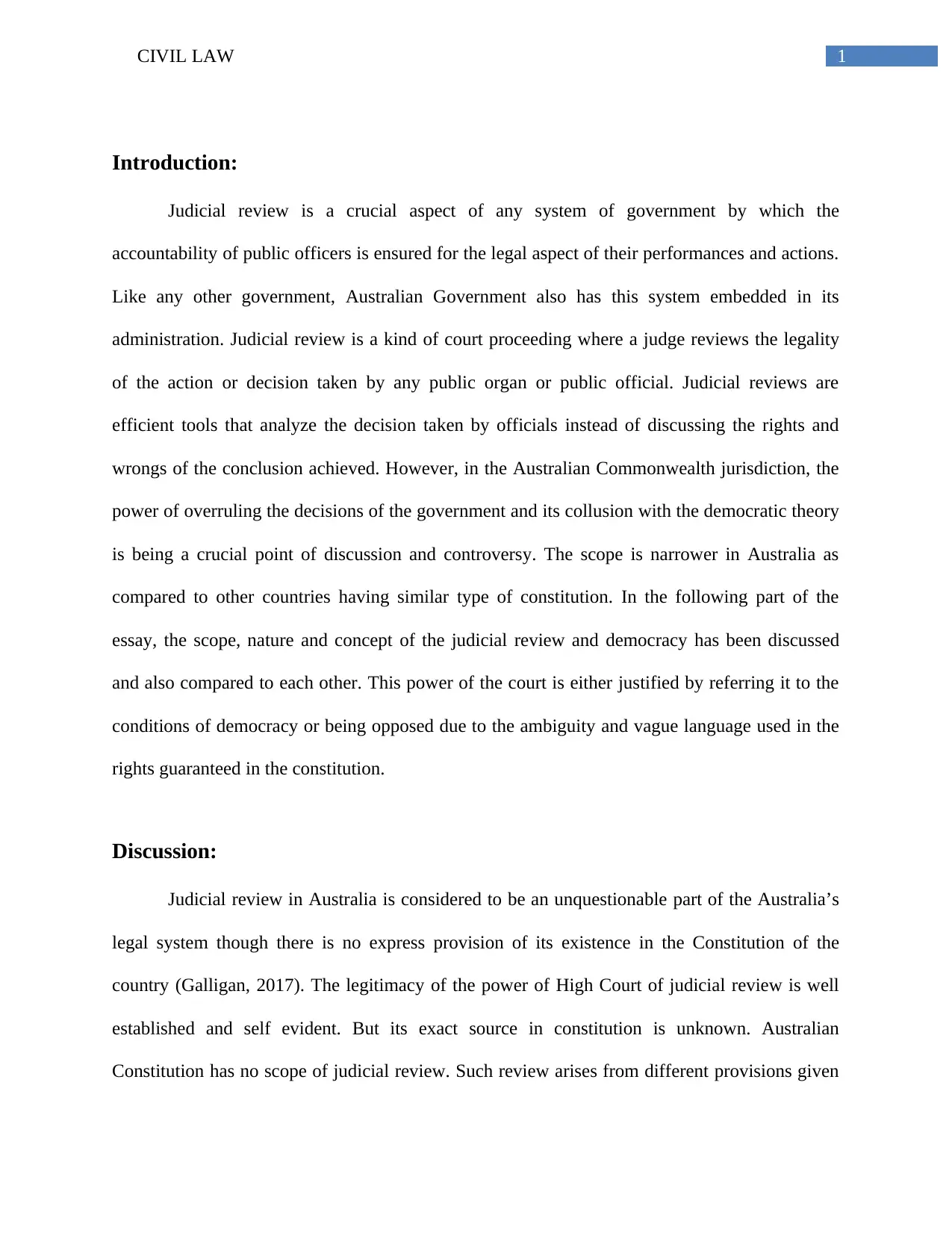
1CIVIL LAW
Introduction:
Judicial review is a crucial aspect of any system of government by which the
accountability of public officers is ensured for the legal aspect of their performances and actions.
Like any other government, Australian Government also has this system embedded in its
administration. Judicial review is a kind of court proceeding where a judge reviews the legality
of the action or decision taken by any public organ or public official. Judicial reviews are
efficient tools that analyze the decision taken by officials instead of discussing the rights and
wrongs of the conclusion achieved. However, in the Australian Commonwealth jurisdiction, the
power of overruling the decisions of the government and its collusion with the democratic theory
is being a crucial point of discussion and controversy. The scope is narrower in Australia as
compared to other countries having similar type of constitution. In the following part of the
essay, the scope, nature and concept of the judicial review and democracy has been discussed
and also compared to each other. This power of the court is either justified by referring it to the
conditions of democracy or being opposed due to the ambiguity and vague language used in the
rights guaranteed in the constitution.
Discussion:
Judicial review in Australia is considered to be an unquestionable part of the Australia’s
legal system though there is no express provision of its existence in the Constitution of the
country (Galligan, 2017). The legitimacy of the power of High Court of judicial review is well
established and self evident. But its exact source in constitution is unknown. Australian
Constitution has no scope of judicial review. Such review arises from different provisions given
Introduction:
Judicial review is a crucial aspect of any system of government by which the
accountability of public officers is ensured for the legal aspect of their performances and actions.
Like any other government, Australian Government also has this system embedded in its
administration. Judicial review is a kind of court proceeding where a judge reviews the legality
of the action or decision taken by any public organ or public official. Judicial reviews are
efficient tools that analyze the decision taken by officials instead of discussing the rights and
wrongs of the conclusion achieved. However, in the Australian Commonwealth jurisdiction, the
power of overruling the decisions of the government and its collusion with the democratic theory
is being a crucial point of discussion and controversy. The scope is narrower in Australia as
compared to other countries having similar type of constitution. In the following part of the
essay, the scope, nature and concept of the judicial review and democracy has been discussed
and also compared to each other. This power of the court is either justified by referring it to the
conditions of democracy or being opposed due to the ambiguity and vague language used in the
rights guaranteed in the constitution.
Discussion:
Judicial review in Australia is considered to be an unquestionable part of the Australia’s
legal system though there is no express provision of its existence in the Constitution of the
country (Galligan, 2017). The legitimacy of the power of High Court of judicial review is well
established and self evident. But its exact source in constitution is unknown. Australian
Constitution has no scope of judicial review. Such review arises from different provisions given
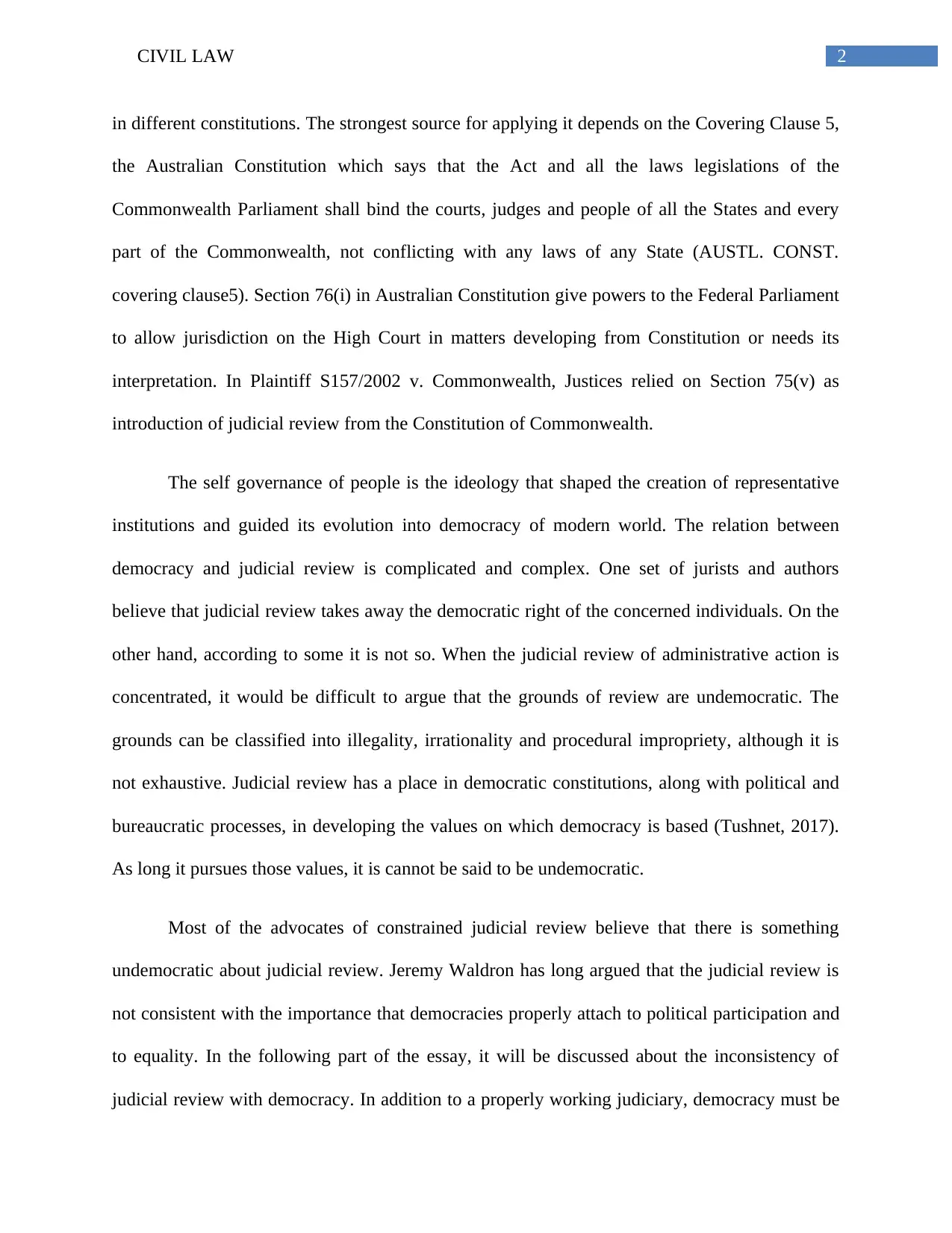
2CIVIL LAW
in different constitutions. The strongest source for applying it depends on the Covering Clause 5,
the Australian Constitution which says that the Act and all the laws legislations of the
Commonwealth Parliament shall bind the courts, judges and people of all the States and every
part of the Commonwealth, not conflicting with any laws of any State (AUSTL. CONST.
covering clause5). Section 76(i) in Australian Constitution give powers to the Federal Parliament
to allow jurisdiction on the High Court in matters developing from Constitution or needs its
interpretation. In Plaintiff S157/2002 v. Commonwealth, Justices relied on Section 75(v) as
introduction of judicial review from the Constitution of Commonwealth.
The self governance of people is the ideology that shaped the creation of representative
institutions and guided its evolution into democracy of modern world. The relation between
democracy and judicial review is complicated and complex. One set of jurists and authors
believe that judicial review takes away the democratic right of the concerned individuals. On the
other hand, according to some it is not so. When the judicial review of administrative action is
concentrated, it would be difficult to argue that the grounds of review are undemocratic. The
grounds can be classified into illegality, irrationality and procedural impropriety, although it is
not exhaustive. Judicial review has a place in democratic constitutions, along with political and
bureaucratic processes, in developing the values on which democracy is based (Tushnet, 2017).
As long it pursues those values, it is cannot be said to be undemocratic.
Most of the advocates of constrained judicial review believe that there is something
undemocratic about judicial review. Jeremy Waldron has long argued that the judicial review is
not consistent with the importance that democracies properly attach to political participation and
to equality. In the following part of the essay, it will be discussed about the inconsistency of
judicial review with democracy. In addition to a properly working judiciary, democracy must be
in different constitutions. The strongest source for applying it depends on the Covering Clause 5,
the Australian Constitution which says that the Act and all the laws legislations of the
Commonwealth Parliament shall bind the courts, judges and people of all the States and every
part of the Commonwealth, not conflicting with any laws of any State (AUSTL. CONST.
covering clause5). Section 76(i) in Australian Constitution give powers to the Federal Parliament
to allow jurisdiction on the High Court in matters developing from Constitution or needs its
interpretation. In Plaintiff S157/2002 v. Commonwealth, Justices relied on Section 75(v) as
introduction of judicial review from the Constitution of Commonwealth.
The self governance of people is the ideology that shaped the creation of representative
institutions and guided its evolution into democracy of modern world. The relation between
democracy and judicial review is complicated and complex. One set of jurists and authors
believe that judicial review takes away the democratic right of the concerned individuals. On the
other hand, according to some it is not so. When the judicial review of administrative action is
concentrated, it would be difficult to argue that the grounds of review are undemocratic. The
grounds can be classified into illegality, irrationality and procedural impropriety, although it is
not exhaustive. Judicial review has a place in democratic constitutions, along with political and
bureaucratic processes, in developing the values on which democracy is based (Tushnet, 2017).
As long it pursues those values, it is cannot be said to be undemocratic.
Most of the advocates of constrained judicial review believe that there is something
undemocratic about judicial review. Jeremy Waldron has long argued that the judicial review is
not consistent with the importance that democracies properly attach to political participation and
to equality. In the following part of the essay, it will be discussed about the inconsistency of
judicial review with democracy. In addition to a properly working judiciary, democracy must be
⊘ This is a preview!⊘
Do you want full access?
Subscribe today to unlock all pages.

Trusted by 1+ million students worldwide
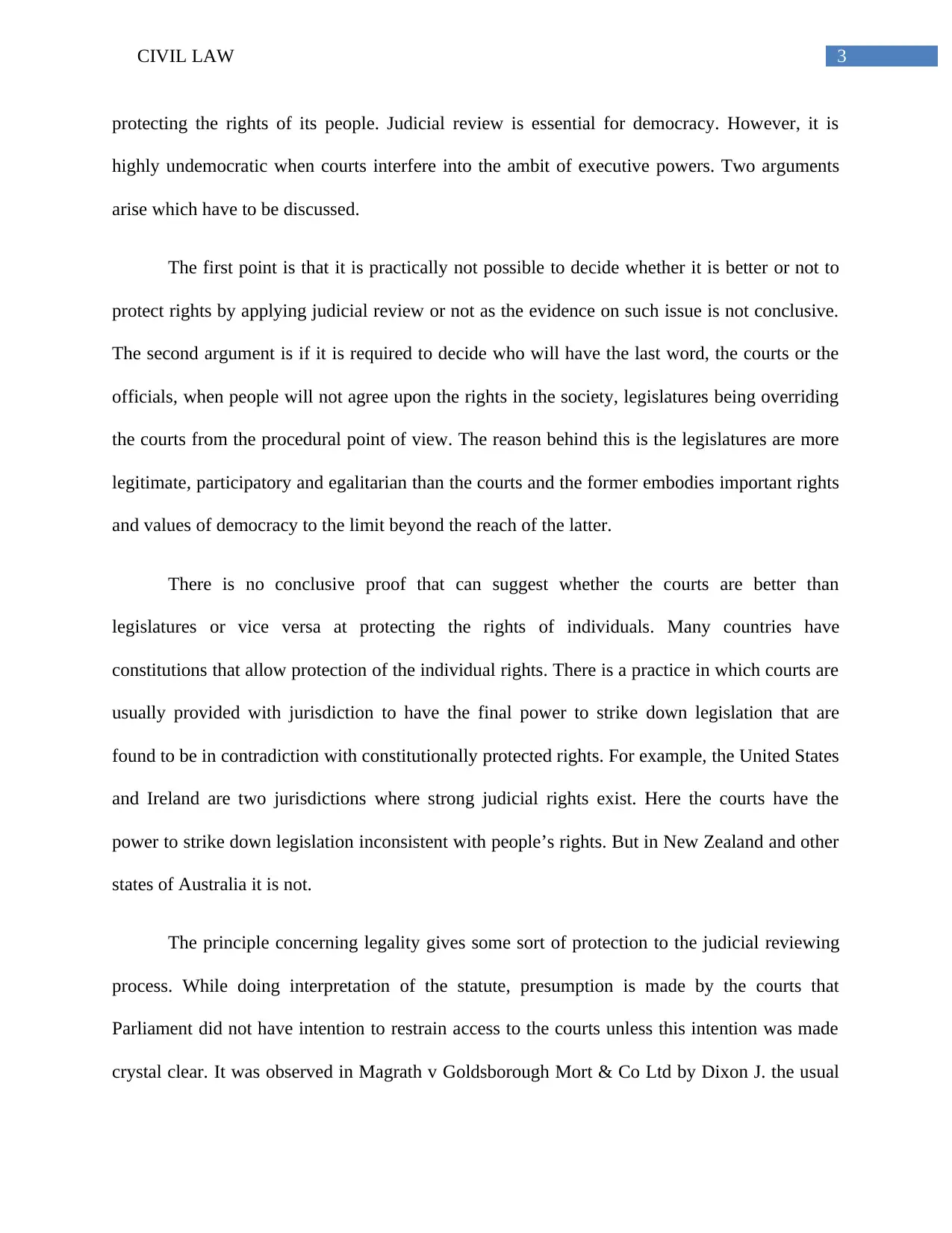
3CIVIL LAW
protecting the rights of its people. Judicial review is essential for democracy. However, it is
highly undemocratic when courts interfere into the ambit of executive powers. Two arguments
arise which have to be discussed.
The first point is that it is practically not possible to decide whether it is better or not to
protect rights by applying judicial review or not as the evidence on such issue is not conclusive.
The second argument is if it is required to decide who will have the last word, the courts or the
officials, when people will not agree upon the rights in the society, legislatures being overriding
the courts from the procedural point of view. The reason behind this is the legislatures are more
legitimate, participatory and egalitarian than the courts and the former embodies important rights
and values of democracy to the limit beyond the reach of the latter.
There is no conclusive proof that can suggest whether the courts are better than
legislatures or vice versa at protecting the rights of individuals. Many countries have
constitutions that allow protection of the individual rights. There is a practice in which courts are
usually provided with jurisdiction to have the final power to strike down legislation that are
found to be in contradiction with constitutionally protected rights. For example, the United States
and Ireland are two jurisdictions where strong judicial rights exist. Here the courts have the
power to strike down legislation inconsistent with people’s rights. But in New Zealand and other
states of Australia it is not.
The principle concerning legality gives some sort of protection to the judicial reviewing
process. While doing interpretation of the statute, presumption is made by the courts that
Parliament did not have intention to restrain access to the courts unless this intention was made
crystal clear. It was observed in Magrath v Goldsborough Mort & Co Ltd by Dixon J. the usual
protecting the rights of its people. Judicial review is essential for democracy. However, it is
highly undemocratic when courts interfere into the ambit of executive powers. Two arguments
arise which have to be discussed.
The first point is that it is practically not possible to decide whether it is better or not to
protect rights by applying judicial review or not as the evidence on such issue is not conclusive.
The second argument is if it is required to decide who will have the last word, the courts or the
officials, when people will not agree upon the rights in the society, legislatures being overriding
the courts from the procedural point of view. The reason behind this is the legislatures are more
legitimate, participatory and egalitarian than the courts and the former embodies important rights
and values of democracy to the limit beyond the reach of the latter.
There is no conclusive proof that can suggest whether the courts are better than
legislatures or vice versa at protecting the rights of individuals. Many countries have
constitutions that allow protection of the individual rights. There is a practice in which courts are
usually provided with jurisdiction to have the final power to strike down legislation that are
found to be in contradiction with constitutionally protected rights. For example, the United States
and Ireland are two jurisdictions where strong judicial rights exist. Here the courts have the
power to strike down legislation inconsistent with people’s rights. But in New Zealand and other
states of Australia it is not.
The principle concerning legality gives some sort of protection to the judicial reviewing
process. While doing interpretation of the statute, presumption is made by the courts that
Parliament did not have intention to restrain access to the courts unless this intention was made
crystal clear. It was observed in Magrath v Goldsborough Mort & Co Ltd by Dixon J. the usual
Paraphrase This Document
Need a fresh take? Get an instant paraphrase of this document with our AI Paraphraser
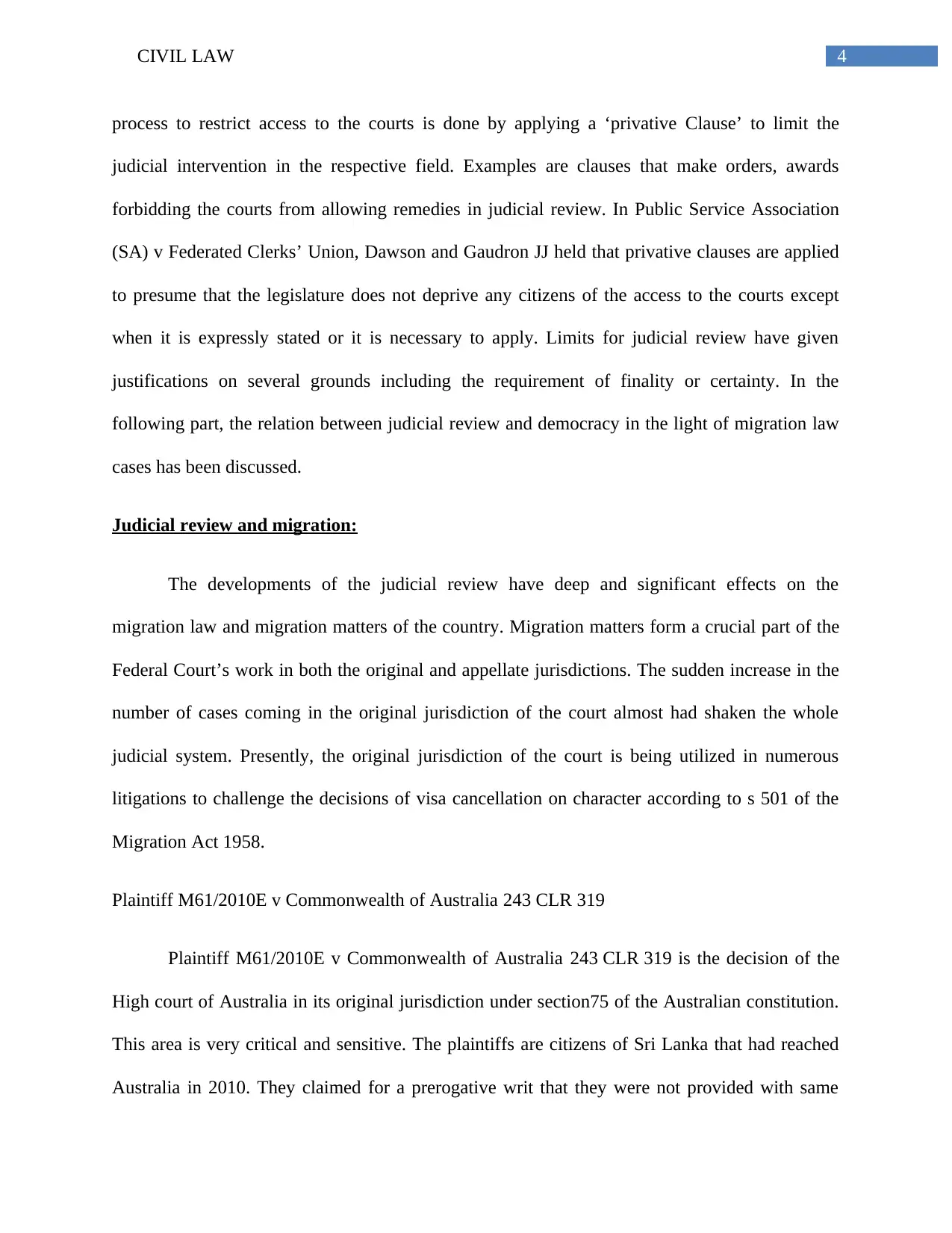
4CIVIL LAW
process to restrict access to the courts is done by applying a ‘privative Clause’ to limit the
judicial intervention in the respective field. Examples are clauses that make orders, awards
forbidding the courts from allowing remedies in judicial review. In Public Service Association
(SA) v Federated Clerks’ Union, Dawson and Gaudron JJ held that privative clauses are applied
to presume that the legislature does not deprive any citizens of the access to the courts except
when it is expressly stated or it is necessary to apply. Limits for judicial review have given
justifications on several grounds including the requirement of finality or certainty. In the
following part, the relation between judicial review and democracy in the light of migration law
cases has been discussed.
Judicial review and migration:
The developments of the judicial review have deep and significant effects on the
migration law and migration matters of the country. Migration matters form a crucial part of the
Federal Court’s work in both the original and appellate jurisdictions. The sudden increase in the
number of cases coming in the original jurisdiction of the court almost had shaken the whole
judicial system. Presently, the original jurisdiction of the court is being utilized in numerous
litigations to challenge the decisions of visa cancellation on character according to s 501 of the
Migration Act 1958.
Plaintiff M61/2010E v Commonwealth of Australia 243 CLR 319
Plaintiff M61/2010E v Commonwealth of Australia 243 CLR 319 is the decision of the
High court of Australia in its original jurisdiction under section75 of the Australian constitution.
This area is very critical and sensitive. The plaintiffs are citizens of Sri Lanka that had reached
Australia in 2010. They claimed for a prerogative writ that they were not provided with same
process to restrict access to the courts is done by applying a ‘privative Clause’ to limit the
judicial intervention in the respective field. Examples are clauses that make orders, awards
forbidding the courts from allowing remedies in judicial review. In Public Service Association
(SA) v Federated Clerks’ Union, Dawson and Gaudron JJ held that privative clauses are applied
to presume that the legislature does not deprive any citizens of the access to the courts except
when it is expressly stated or it is necessary to apply. Limits for judicial review have given
justifications on several grounds including the requirement of finality or certainty. In the
following part, the relation between judicial review and democracy in the light of migration law
cases has been discussed.
Judicial review and migration:
The developments of the judicial review have deep and significant effects on the
migration law and migration matters of the country. Migration matters form a crucial part of the
Federal Court’s work in both the original and appellate jurisdictions. The sudden increase in the
number of cases coming in the original jurisdiction of the court almost had shaken the whole
judicial system. Presently, the original jurisdiction of the court is being utilized in numerous
litigations to challenge the decisions of visa cancellation on character according to s 501 of the
Migration Act 1958.
Plaintiff M61/2010E v Commonwealth of Australia 243 CLR 319
Plaintiff M61/2010E v Commonwealth of Australia 243 CLR 319 is the decision of the
High court of Australia in its original jurisdiction under section75 of the Australian constitution.
This area is very critical and sensitive. The plaintiffs are citizens of Sri Lanka that had reached
Australia in 2010. They claimed for a prerogative writ that they were not provided with same
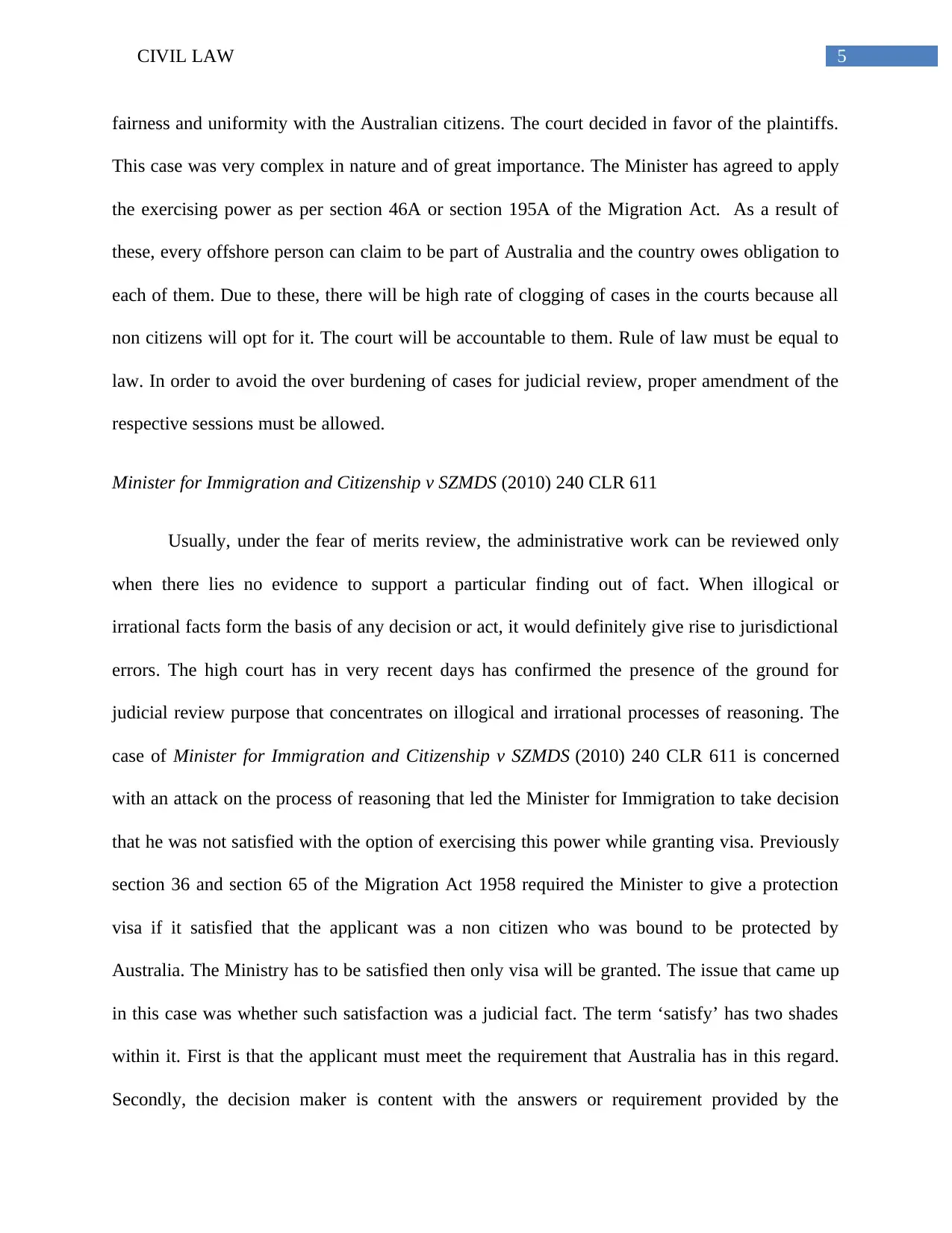
5CIVIL LAW
fairness and uniformity with the Australian citizens. The court decided in favor of the plaintiffs.
This case was very complex in nature and of great importance. The Minister has agreed to apply
the exercising power as per section 46A or section 195A of the Migration Act. As a result of
these, every offshore person can claim to be part of Australia and the country owes obligation to
each of them. Due to these, there will be high rate of clogging of cases in the courts because all
non citizens will opt for it. The court will be accountable to them. Rule of law must be equal to
law. In order to avoid the over burdening of cases for judicial review, proper amendment of the
respective sessions must be allowed.
Minister for Immigration and Citizenship v SZMDS (2010) 240 CLR 611
Usually, under the fear of merits review, the administrative work can be reviewed only
when there lies no evidence to support a particular finding out of fact. When illogical or
irrational facts form the basis of any decision or act, it would definitely give rise to jurisdictional
errors. The high court has in very recent days has confirmed the presence of the ground for
judicial review purpose that concentrates on illogical and irrational processes of reasoning. The
case of Minister for Immigration and Citizenship v SZMDS (2010) 240 CLR 611 is concerned
with an attack on the process of reasoning that led the Minister for Immigration to take decision
that he was not satisfied with the option of exercising this power while granting visa. Previously
section 36 and section 65 of the Migration Act 1958 required the Minister to give a protection
visa if it satisfied that the applicant was a non citizen who was bound to be protected by
Australia. The Ministry has to be satisfied then only visa will be granted. The issue that came up
in this case was whether such satisfaction was a judicial fact. The term ‘satisfy’ has two shades
within it. First is that the applicant must meet the requirement that Australia has in this regard.
Secondly, the decision maker is content with the answers or requirement provided by the
fairness and uniformity with the Australian citizens. The court decided in favor of the plaintiffs.
This case was very complex in nature and of great importance. The Minister has agreed to apply
the exercising power as per section 46A or section 195A of the Migration Act. As a result of
these, every offshore person can claim to be part of Australia and the country owes obligation to
each of them. Due to these, there will be high rate of clogging of cases in the courts because all
non citizens will opt for it. The court will be accountable to them. Rule of law must be equal to
law. In order to avoid the over burdening of cases for judicial review, proper amendment of the
respective sessions must be allowed.
Minister for Immigration and Citizenship v SZMDS (2010) 240 CLR 611
Usually, under the fear of merits review, the administrative work can be reviewed only
when there lies no evidence to support a particular finding out of fact. When illogical or
irrational facts form the basis of any decision or act, it would definitely give rise to jurisdictional
errors. The high court has in very recent days has confirmed the presence of the ground for
judicial review purpose that concentrates on illogical and irrational processes of reasoning. The
case of Minister for Immigration and Citizenship v SZMDS (2010) 240 CLR 611 is concerned
with an attack on the process of reasoning that led the Minister for Immigration to take decision
that he was not satisfied with the option of exercising this power while granting visa. Previously
section 36 and section 65 of the Migration Act 1958 required the Minister to give a protection
visa if it satisfied that the applicant was a non citizen who was bound to be protected by
Australia. The Ministry has to be satisfied then only visa will be granted. The issue that came up
in this case was whether such satisfaction was a judicial fact. The term ‘satisfy’ has two shades
within it. First is that the applicant must meet the requirement that Australia has in this regard.
Secondly, the decision maker is content with the answers or requirement provided by the
⊘ This is a preview!⊘
Do you want full access?
Subscribe today to unlock all pages.

Trusted by 1+ million students worldwide
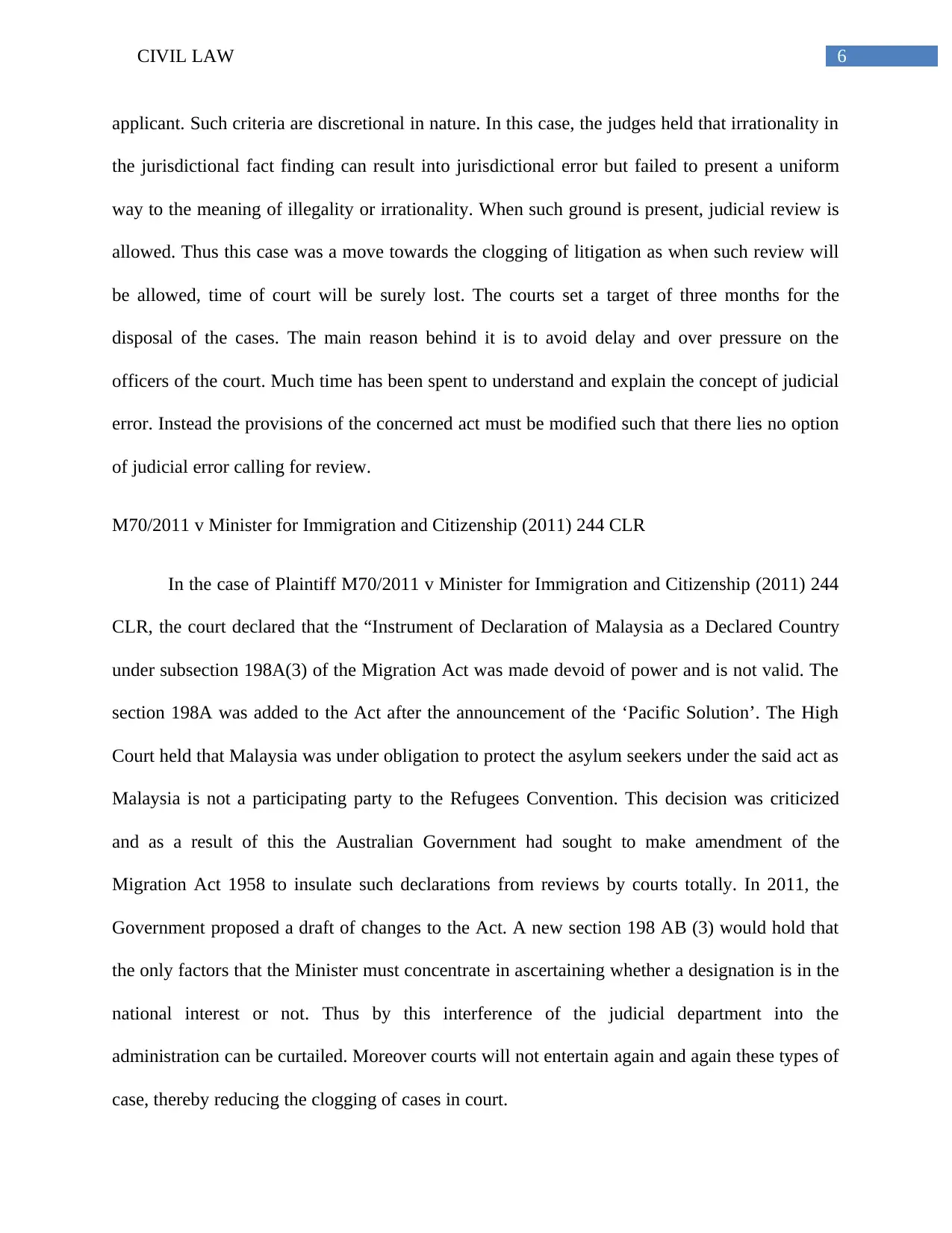
6CIVIL LAW
applicant. Such criteria are discretional in nature. In this case, the judges held that irrationality in
the jurisdictional fact finding can result into jurisdictional error but failed to present a uniform
way to the meaning of illegality or irrationality. When such ground is present, judicial review is
allowed. Thus this case was a move towards the clogging of litigation as when such review will
be allowed, time of court will be surely lost. The courts set a target of three months for the
disposal of the cases. The main reason behind it is to avoid delay and over pressure on the
officers of the court. Much time has been spent to understand and explain the concept of judicial
error. Instead the provisions of the concerned act must be modified such that there lies no option
of judicial error calling for review.
M70/2011 v Minister for Immigration and Citizenship (2011) 244 CLR
In the case of Plaintiff M70/2011 v Minister for Immigration and Citizenship (2011) 244
CLR, the court declared that the “Instrument of Declaration of Malaysia as a Declared Country
under subsection 198A(3) of the Migration Act was made devoid of power and is not valid. The
section 198A was added to the Act after the announcement of the ‘Pacific Solution’. The High
Court held that Malaysia was under obligation to protect the asylum seekers under the said act as
Malaysia is not a participating party to the Refugees Convention. This decision was criticized
and as a result of this the Australian Government had sought to make amendment of the
Migration Act 1958 to insulate such declarations from reviews by courts totally. In 2011, the
Government proposed a draft of changes to the Act. A new section 198 AB (3) would hold that
the only factors that the Minister must concentrate in ascertaining whether a designation is in the
national interest or not. Thus by this interference of the judicial department into the
administration can be curtailed. Moreover courts will not entertain again and again these types of
case, thereby reducing the clogging of cases in court.
applicant. Such criteria are discretional in nature. In this case, the judges held that irrationality in
the jurisdictional fact finding can result into jurisdictional error but failed to present a uniform
way to the meaning of illegality or irrationality. When such ground is present, judicial review is
allowed. Thus this case was a move towards the clogging of litigation as when such review will
be allowed, time of court will be surely lost. The courts set a target of three months for the
disposal of the cases. The main reason behind it is to avoid delay and over pressure on the
officers of the court. Much time has been spent to understand and explain the concept of judicial
error. Instead the provisions of the concerned act must be modified such that there lies no option
of judicial error calling for review.
M70/2011 v Minister for Immigration and Citizenship (2011) 244 CLR
In the case of Plaintiff M70/2011 v Minister for Immigration and Citizenship (2011) 244
CLR, the court declared that the “Instrument of Declaration of Malaysia as a Declared Country
under subsection 198A(3) of the Migration Act was made devoid of power and is not valid. The
section 198A was added to the Act after the announcement of the ‘Pacific Solution’. The High
Court held that Malaysia was under obligation to protect the asylum seekers under the said act as
Malaysia is not a participating party to the Refugees Convention. This decision was criticized
and as a result of this the Australian Government had sought to make amendment of the
Migration Act 1958 to insulate such declarations from reviews by courts totally. In 2011, the
Government proposed a draft of changes to the Act. A new section 198 AB (3) would hold that
the only factors that the Minister must concentrate in ascertaining whether a designation is in the
national interest or not. Thus by this interference of the judicial department into the
administration can be curtailed. Moreover courts will not entertain again and again these types of
case, thereby reducing the clogging of cases in court.
Paraphrase This Document
Need a fresh take? Get an instant paraphrase of this document with our AI Paraphraser
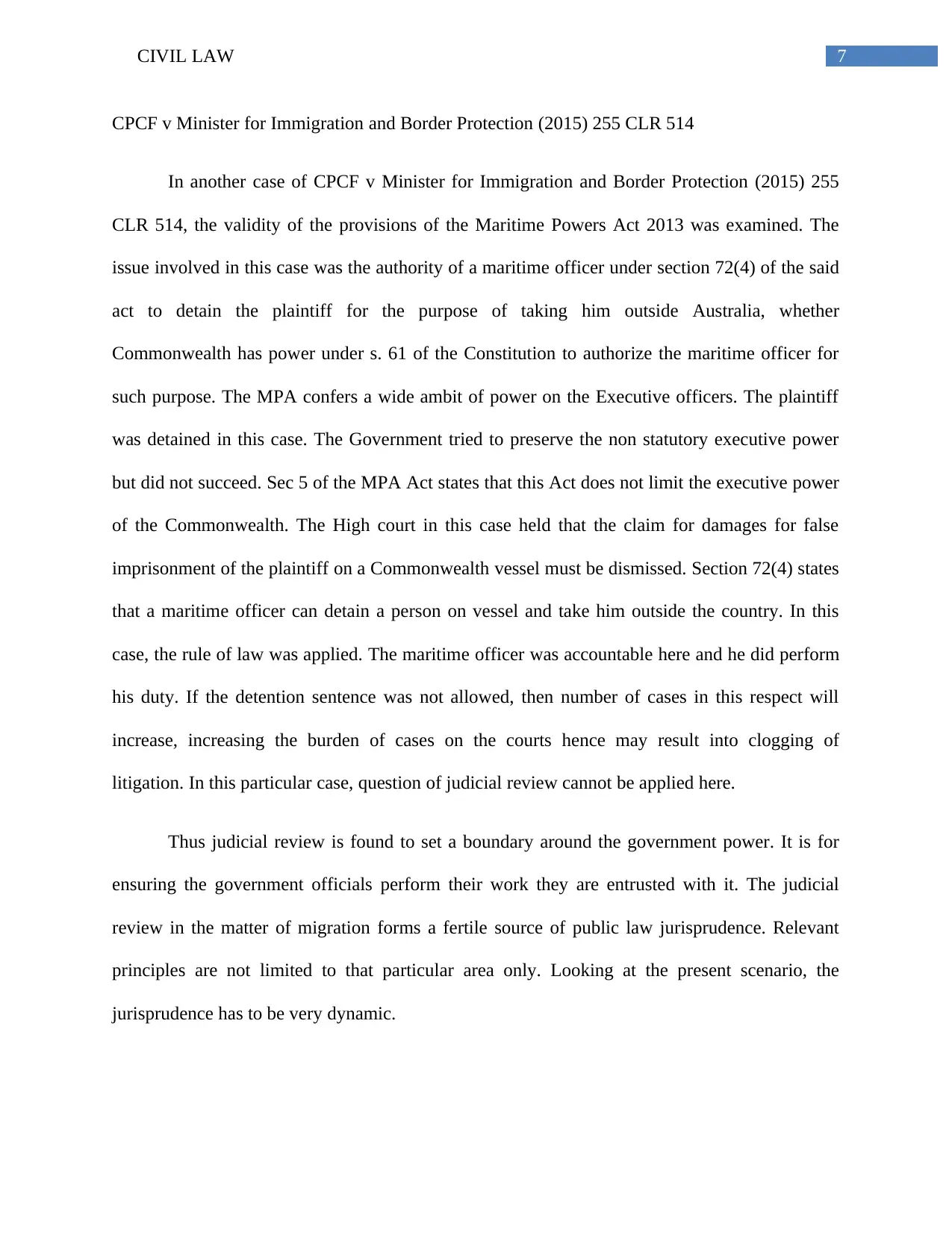
7CIVIL LAW
CPCF v Minister for Immigration and Border Protection (2015) 255 CLR 514
In another case of CPCF v Minister for Immigration and Border Protection (2015) 255
CLR 514, the validity of the provisions of the Maritime Powers Act 2013 was examined. The
issue involved in this case was the authority of a maritime officer under section 72(4) of the said
act to detain the plaintiff for the purpose of taking him outside Australia, whether
Commonwealth has power under s. 61 of the Constitution to authorize the maritime officer for
such purpose. The MPA confers a wide ambit of power on the Executive officers. The plaintiff
was detained in this case. The Government tried to preserve the non statutory executive power
but did not succeed. Sec 5 of the MPA Act states that this Act does not limit the executive power
of the Commonwealth. The High court in this case held that the claim for damages for false
imprisonment of the plaintiff on a Commonwealth vessel must be dismissed. Section 72(4) states
that a maritime officer can detain a person on vessel and take him outside the country. In this
case, the rule of law was applied. The maritime officer was accountable here and he did perform
his duty. If the detention sentence was not allowed, then number of cases in this respect will
increase, increasing the burden of cases on the courts hence may result into clogging of
litigation. In this particular case, question of judicial review cannot be applied here.
Thus judicial review is found to set a boundary around the government power. It is for
ensuring the government officials perform their work they are entrusted with it. The judicial
review in the matter of migration forms a fertile source of public law jurisprudence. Relevant
principles are not limited to that particular area only. Looking at the present scenario, the
jurisprudence has to be very dynamic.
CPCF v Minister for Immigration and Border Protection (2015) 255 CLR 514
In another case of CPCF v Minister for Immigration and Border Protection (2015) 255
CLR 514, the validity of the provisions of the Maritime Powers Act 2013 was examined. The
issue involved in this case was the authority of a maritime officer under section 72(4) of the said
act to detain the plaintiff for the purpose of taking him outside Australia, whether
Commonwealth has power under s. 61 of the Constitution to authorize the maritime officer for
such purpose. The MPA confers a wide ambit of power on the Executive officers. The plaintiff
was detained in this case. The Government tried to preserve the non statutory executive power
but did not succeed. Sec 5 of the MPA Act states that this Act does not limit the executive power
of the Commonwealth. The High court in this case held that the claim for damages for false
imprisonment of the plaintiff on a Commonwealth vessel must be dismissed. Section 72(4) states
that a maritime officer can detain a person on vessel and take him outside the country. In this
case, the rule of law was applied. The maritime officer was accountable here and he did perform
his duty. If the detention sentence was not allowed, then number of cases in this respect will
increase, increasing the burden of cases on the courts hence may result into clogging of
litigation. In this particular case, question of judicial review cannot be applied here.
Thus judicial review is found to set a boundary around the government power. It is for
ensuring the government officials perform their work they are entrusted with it. The judicial
review in the matter of migration forms a fertile source of public law jurisprudence. Relevant
principles are not limited to that particular area only. Looking at the present scenario, the
jurisprudence has to be very dynamic.
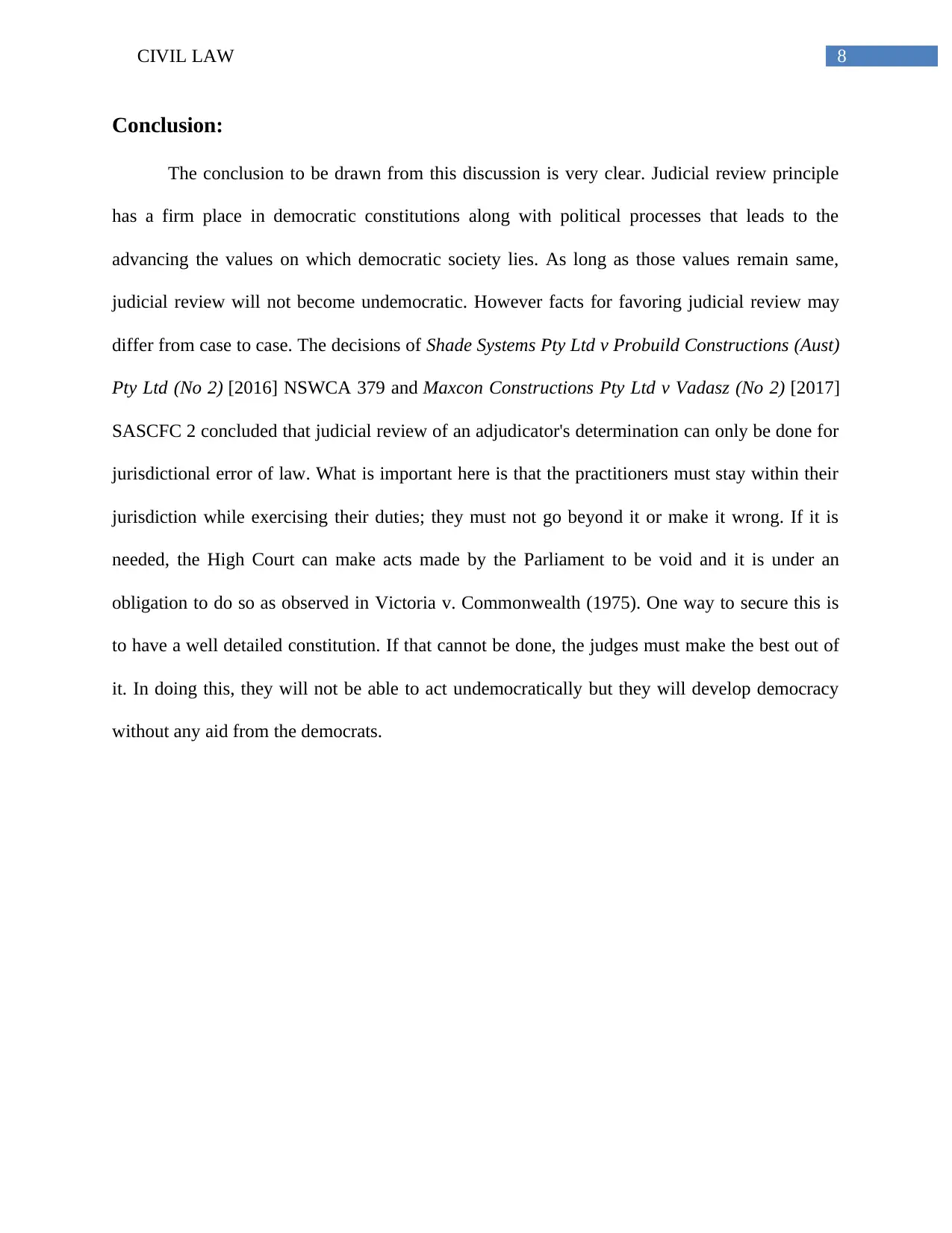
8CIVIL LAW
Conclusion:
The conclusion to be drawn from this discussion is very clear. Judicial review principle
has a firm place in democratic constitutions along with political processes that leads to the
advancing the values on which democratic society lies. As long as those values remain same,
judicial review will not become undemocratic. However facts for favoring judicial review may
differ from case to case. The decisions of Shade Systems Pty Ltd v Probuild Constructions (Aust)
Pty Ltd (No 2) [2016] NSWCA 379 and Maxcon Constructions Pty Ltd v Vadasz (No 2) [2017]
SASCFC 2 concluded that judicial review of an adjudicator's determination can only be done for
jurisdictional error of law. What is important here is that the practitioners must stay within their
jurisdiction while exercising their duties; they must not go beyond it or make it wrong. If it is
needed, the High Court can make acts made by the Parliament to be void and it is under an
obligation to do so as observed in Victoria v. Commonwealth (1975). One way to secure this is
to have a well detailed constitution. If that cannot be done, the judges must make the best out of
it. In doing this, they will not be able to act undemocratically but they will develop democracy
without any aid from the democrats.
Conclusion:
The conclusion to be drawn from this discussion is very clear. Judicial review principle
has a firm place in democratic constitutions along with political processes that leads to the
advancing the values on which democratic society lies. As long as those values remain same,
judicial review will not become undemocratic. However facts for favoring judicial review may
differ from case to case. The decisions of Shade Systems Pty Ltd v Probuild Constructions (Aust)
Pty Ltd (No 2) [2016] NSWCA 379 and Maxcon Constructions Pty Ltd v Vadasz (No 2) [2017]
SASCFC 2 concluded that judicial review of an adjudicator's determination can only be done for
jurisdictional error of law. What is important here is that the practitioners must stay within their
jurisdiction while exercising their duties; they must not go beyond it or make it wrong. If it is
needed, the High Court can make acts made by the Parliament to be void and it is under an
obligation to do so as observed in Victoria v. Commonwealth (1975). One way to secure this is
to have a well detailed constitution. If that cannot be done, the judges must make the best out of
it. In doing this, they will not be able to act undemocratically but they will develop democracy
without any aid from the democrats.
⊘ This is a preview!⊘
Do you want full access?
Subscribe today to unlock all pages.

Trusted by 1+ million students worldwide
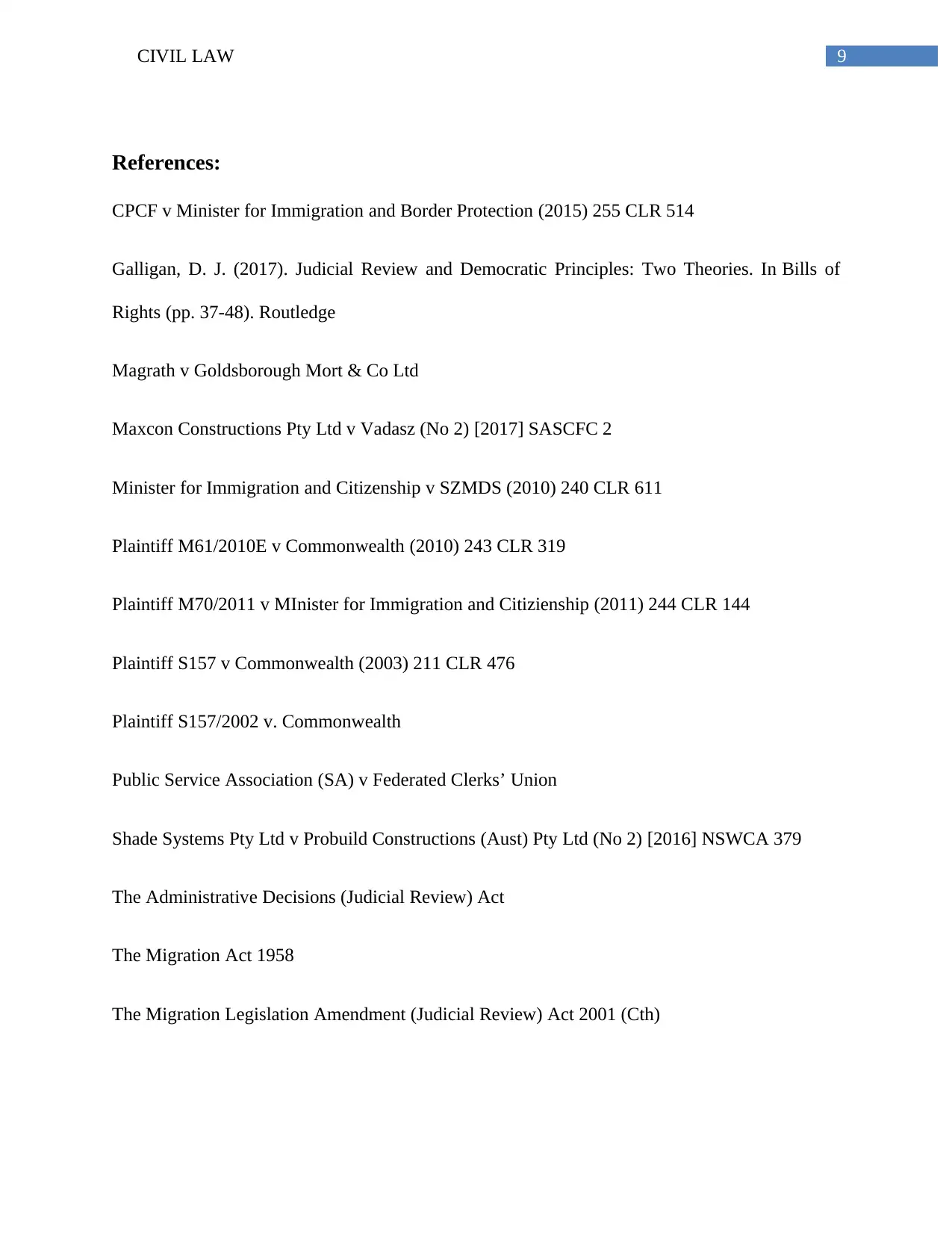
9CIVIL LAW
References:
CPCF v Minister for Immigration and Border Protection (2015) 255 CLR 514
Galligan, D. J. (2017). Judicial Review and Democratic Principles: Two Theories. In Bills of
Rights (pp. 37-48). Routledge
Magrath v Goldsborough Mort & Co Ltd
Maxcon Constructions Pty Ltd v Vadasz (No 2) [2017] SASCFC 2
Minister for Immigration and Citizenship v SZMDS (2010) 240 CLR 611
Plaintiff M61/2010E v Commonwealth (2010) 243 CLR 319
Plaintiff M70/2011 v MInister for Immigration and Citizienship (2011) 244 CLR 144
Plaintiff S157 v Commonwealth (2003) 211 CLR 476
Plaintiff S157/2002 v. Commonwealth
Public Service Association (SA) v Federated Clerks’ Union
Shade Systems Pty Ltd v Probuild Constructions (Aust) Pty Ltd (No 2) [2016] NSWCA 379
The Administrative Decisions (Judicial Review) Act
The Migration Act 1958
The Migration Legislation Amendment (Judicial Review) Act 2001 (Cth)
References:
CPCF v Minister for Immigration and Border Protection (2015) 255 CLR 514
Galligan, D. J. (2017). Judicial Review and Democratic Principles: Two Theories. In Bills of
Rights (pp. 37-48). Routledge
Magrath v Goldsborough Mort & Co Ltd
Maxcon Constructions Pty Ltd v Vadasz (No 2) [2017] SASCFC 2
Minister for Immigration and Citizenship v SZMDS (2010) 240 CLR 611
Plaintiff M61/2010E v Commonwealth (2010) 243 CLR 319
Plaintiff M70/2011 v MInister for Immigration and Citizienship (2011) 244 CLR 144
Plaintiff S157 v Commonwealth (2003) 211 CLR 476
Plaintiff S157/2002 v. Commonwealth
Public Service Association (SA) v Federated Clerks’ Union
Shade Systems Pty Ltd v Probuild Constructions (Aust) Pty Ltd (No 2) [2016] NSWCA 379
The Administrative Decisions (Judicial Review) Act
The Migration Act 1958
The Migration Legislation Amendment (Judicial Review) Act 2001 (Cth)
Paraphrase This Document
Need a fresh take? Get an instant paraphrase of this document with our AI Paraphraser

10CIVIL LAW
Tushnet, M. (2017). New forms of judicial review and the persistence of rights-and democracy-
based worries. In Bills of Rights (pp. 265-290). Routledge.
Victoria v. Commonwealth (1975)
Tushnet, M. (2017). New forms of judicial review and the persistence of rights-and democracy-
based worries. In Bills of Rights (pp. 265-290). Routledge.
Victoria v. Commonwealth (1975)
1 out of 11
Related Documents
Your All-in-One AI-Powered Toolkit for Academic Success.
+13062052269
info@desklib.com
Available 24*7 on WhatsApp / Email
![[object Object]](/_next/static/media/star-bottom.7253800d.svg)
Unlock your academic potential
Copyright © 2020–2026 A2Z Services. All Rights Reserved. Developed and managed by ZUCOL.





